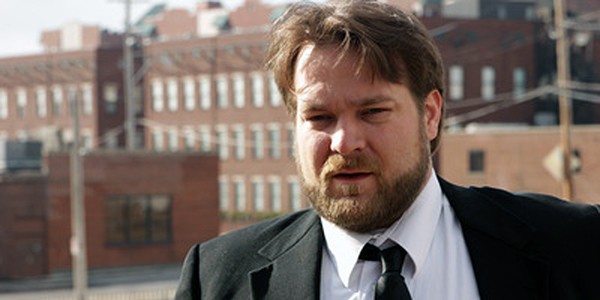This time in the Never Seen It hot seat is Markus Seaberry, prolific Memphis film and television actor and co-host of the Black Nerd Power podcast. He had never seen the 1986 Jim Henson fantasy Labyrinth, which was released 35 years ago this summer. We set out to fix that oversight.
Chris McCoy: What do you know about Labyrinth?
Markus Seaberry: I know David Bowie is in it, Jennifer Connelly is in it, and Jim Henson put some Muppets in it. I didn’t see it, because, for my African American churchgoing parents, the trailer has to have Black people prominent in it, or it’s no deal. That’s true to this day. I tried to show them Slumdog Millionaire, and they were like, “Where’s the Black folks?”
CM: We talked for a long time about what movie you wanted to do, and you ended up picking this one. Why, out of all the films we discussed, did you pick this one, specifically?
MS: Because I feel like my eighties kid cred is not official until I see Labyrinth and The Dark Crystal. In the early days of my podcast, Black Nerd Power, my co-host Richard Douglas Jones, found out I had never seen them, and our friendship has never been the same.
CM: OK, time to save a friendship. Let’s go.
101 minutes later…
CM: You are now someone who has seen Labyrinth. What did you think?
MS: I’m freaking out. My mind is not used to so many practical effects! It’s been so long since I’ve seen a film like this, because everything now is just CGI’d to hell. And it’s great! I love the battle scene where you get live chickens, a puppet on a live dog, Muppets all around, puppeteers in the mix controlling the big monster Ludo, and then a live Jennifer Connolly. And it’s all mixing together like orderly chaos.
CM: It feels real, in a way that the Marvel movies don’t. It hit me during that scene that this film has a “Marvel third act,” where the heroes fight a faceless army that comes out of nowhere. I guess movies have been doing that for a long time. I may not have seen this movie since the ’80s. It came out while I was working in a movie theater, so I saw everything. I remember seeing it on VHS, too. It was a lot better than I remembered.
MS: I liked in the beginning, they show you a shot of Maurice Sendak’s Where The Wild Things Are. Then, in the closing credits, it said “Jim Henson acknowledges his debt to the works of Maurice Sendak.”
CM: Ludo looks like one of those big Wild Things.
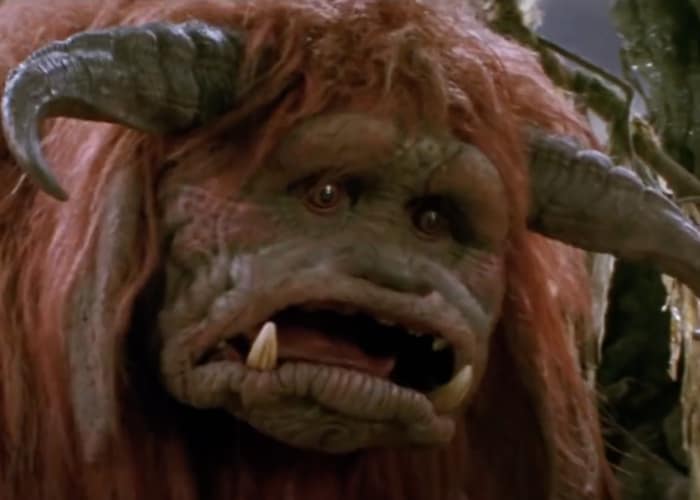
CM: Like you said while we were watching it, there is a very strong Wizard of Oz thing going on. Our heroine is not following the Yellow Brick Road, but she’s finding her way through the labyrinth. There are also a lot of beats from Alice in Wonderland. Terry Jones wrote the first draft. It’s obvious that a lot more thought went into the story than you see in a lot of movies today. It’s a dude from Monty Python self-consciously trying to construct a fairy tale-like narrative. All those guys were super well-educated. I think Terry Jones went to Oxford.
MS: I dug it. Yo, we gotta talk about Bowie, man! I mean, wow! Normally in stuff like this, I prefer people to play it straight, because I feel like if you ham it up, it makes it a cartoon. But I think this needed to be kind of cartoony and over the top. Bowie hamming it up worked, and it was cool to hear him singing the songs in the middle. It gave a kind of a musical aspect.
CM: He’s so good. And you know, whenever he acts, he’s always great. Like in The Prestige, he’s Tesla, playing opposite Christian Bale, and it’s just perfect. But yeah, you’re right about playing villains low-key. I mean, I love seeing people go over the top if they do it right. It’s such a tightrope walk.
MS: He was just perfect the whole time.
CM: Another great actor who goes over-the-top in an eighties fantasy movie is Max Von Sydow in Flash Gordon.
MS: Ming the Merciless!
CM: He might be my favorite on-screen villain. But then, from around the same time, you’ve also got James Earl Jones as Thulsa Doom in Conan The Barbarian. He plays it straight, like you were saying, and it’s chilling.
CM: Those sets! There’s that one shot, where Ludo comes out of the top of the tower, and you see the whole city behind him. That was real!
MS: Hammers and nails created that, not ones and zeroes.
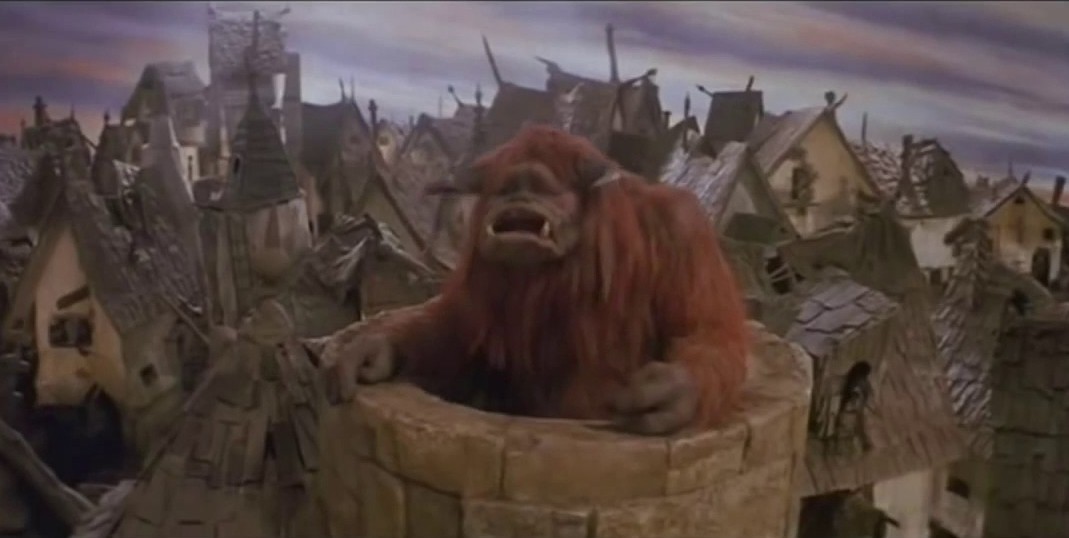
CM: And that scene when that room blows up, and Sarah flies out—they really did that!
MS: Well, she had a stunt double. The first thing I saw Jennifer Connelly in was The Rocketeer. She was young in that, but she was really young in this.
CM: She was 16. This is a super hard part. Can you imagine how long they were on set?
MS: It just seems like a lot of moving pieces.
CM: They were throwing everything at it, too. There was rear projection, there was green screen. There were all kinds of practical sets. There were puppets everywhere. The MC Escher sequence, that was insane. To me, it was better than the Escher sequence in Doctor Strange.
MS: Hey now, you know I’m a Marvel zombie, man.
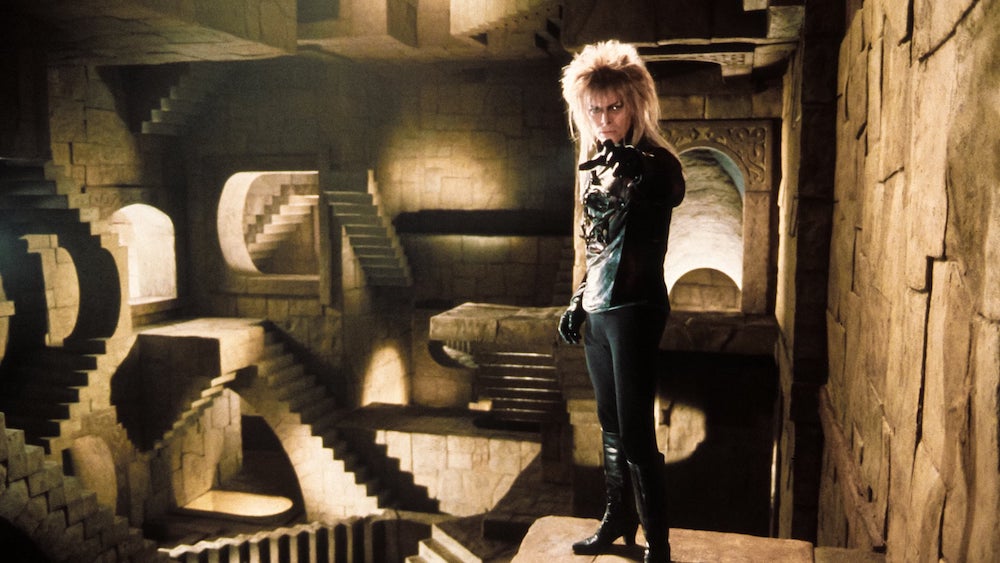
CM: We need to talk about David Bowie’s penis.
MS: Oh, God….
CM: It was very prominent.
MS: It was inescapable.
CM: There was one shot, we both said something. The bulge had its own fill light.
MS: Do you think he used a sock, or not?
CM: No, I think the Thin White Duke was packing heat.
MS: More like the Thick White Duke.
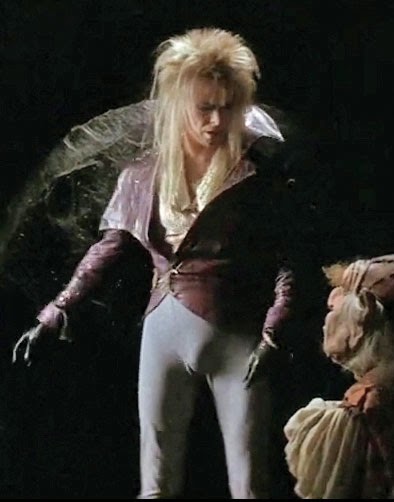
CM: This is a fairy tale with a female protagonist. I know the Hero’s Journey — everybody knows the Hero’s Journey — but there is a corresponding Heroine’s Journey that I don’t really know as well.
MS: It also is cool that she didn’t feel like your typical damsel in distress to me. I mean, she had help. I’m a dude and I feel like that’s condescending, so I can only imagine what women feel like. It’s like, yo, let the woman save herself sometimes.
CM: And she solves problems not by fighting, but by persuading friends to help her. She figures things out herself. She solves the riddle where one guard always lies, and the other one always tells the truth. She solves problems by making friends. That’s part of it. Like I said, I don’t know the Heroine’s Journey, but women protagonists in this kind of stuff, they don’t refuse the call to adventure, where in the Hero’s Journey, he always refuses the call to adventure, and is then forced to go anyway. Even Jesus refuses the call, you know? But Sarah never does. Look at Rey in the Star Wars sequel trilogy, in The Force Awakens. She never refuses the call, either.
MS: That’s true. I gotta say, it’s cheesy, but I liked it. I think fantasy can be too self-absorbed, too self-important sometimes. Sometimes you just want scrambled eggs for breakfast.
CM: It’s fun and cheesy, but it’s also psychologically grounded. It’s that eighties high fantasy, but this is the moment that the eighties aesthetic became decadent. This is considered the low point of Bowie’s entire career, musically. And, um, it’s not great. The synthesizer stuff that seemed so sophisticated and Euro a few years earlier now just seems chintzy.
MS: I still dream of owning a keytar.
CM: Well, yeah. Of course.
MS: I was willing to accept the asethetics because there’s heart to it. Listen, I was a little let down by the final confrontation, because it wasn’t as physical as I probably would have liked, but that’s not what Jennifer Connelly’s character was doing. She’s not carrying a big stick and breaking stuff. She’s been using her wits to elude the villain and rescue her baby brother.
CM: And if you think about it, the ending is her telling a toxic boyfriend to fuck off.
MS: I see that. I see that.
CM: Getting back to David Bowie’s package, there’s a very strong element of her sexual awakening. She eats the fruit, like Persephone, and then she’s transported to like this Eyes Wide Shut sex ball, and Bowie sings the best song in the movie, “As The World Falls Down.”
MS: I thought it looked like a Calvin Klein commercial.
CM: The thing that she’s most threatened by is being attracted to David Bowie. But Jareth is a total toxic boyfriend who’s gaslighting her the whole time. At the end, he was like, “Oh, what are you doing to me? I did everything for you, and you’re throwing me away!” Classic toxic boyfriend move. Then she says, “You have no more power over me!” That’s how she wins: She breaks up with the chump.
MS: There’s a little love morality tale, there. And we need to start a punk band called David Bowie’s Package.
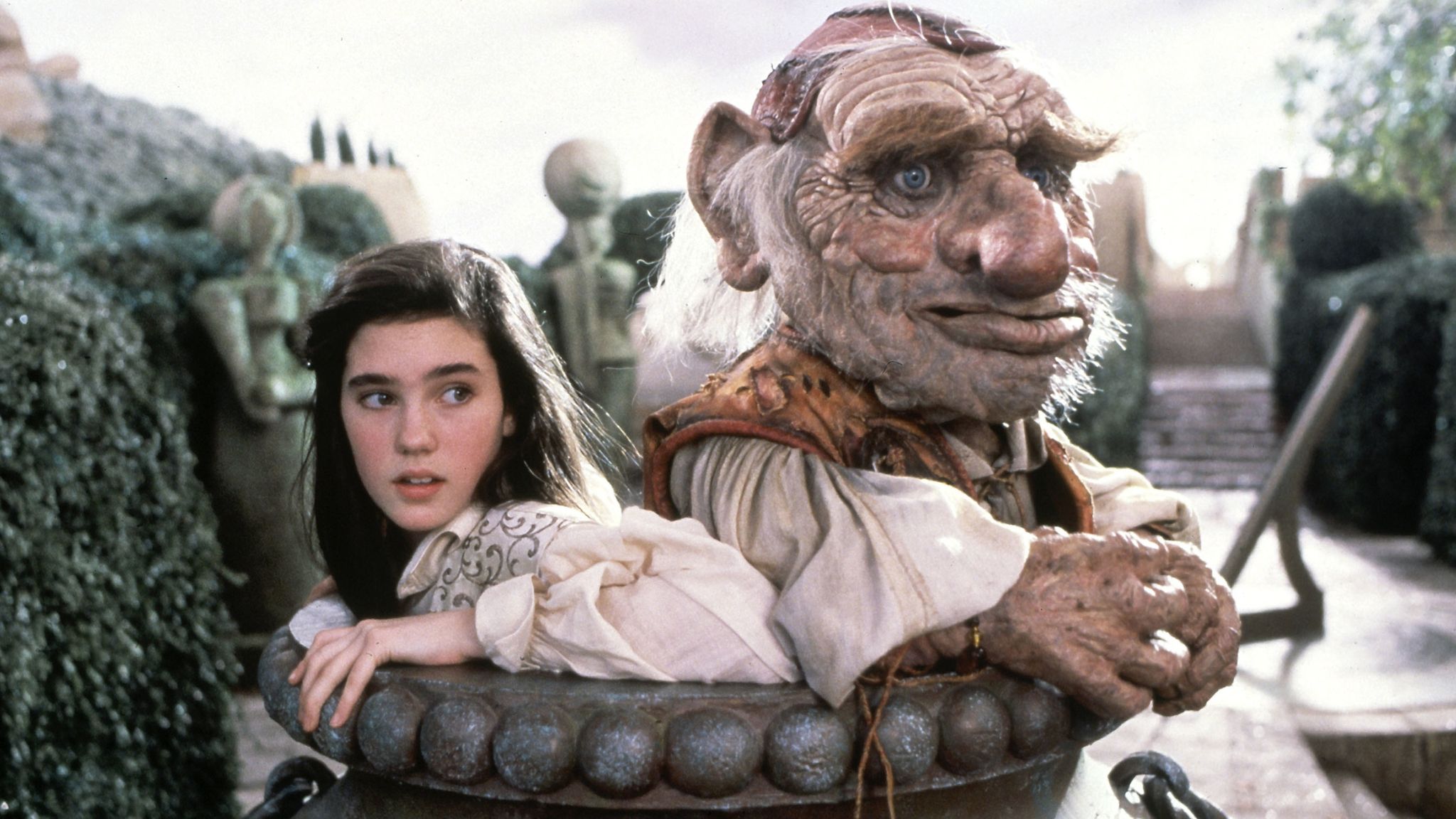
MS: Hoggle man. I thought he was so ugly, I thought he was going to be villanous. He was an unwilling servant, but as time went on, he became more sympathetic and grew on me.
CM: She’s the one who says “You are my friend.” And he’s like, “Nobody accepts me as a friend.” Once again, she solves problems by using empathy and making friends.
MS: And also Ludo is the best!
CM: He’s the Chewbacca figure who can command smelly rocks, somehow.
MS: Yeah. I was trying to figure out. I thought it was telekinesis, but it’s more of a voice command. It’s more like a summoning.
CM: If it was D&D, his special power would be Summon Fart Rocks.
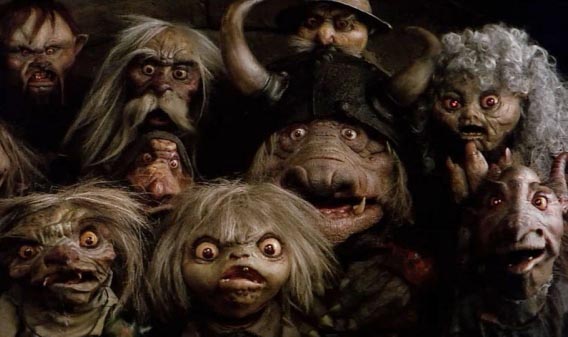
CM: So, bottom line, would you recommend Labyrinth to people?
MS: Yes, but with parameters. Know that it’s cheesy, and embrace it. It’s not trying to be cool. And the heart balances out the cheese.
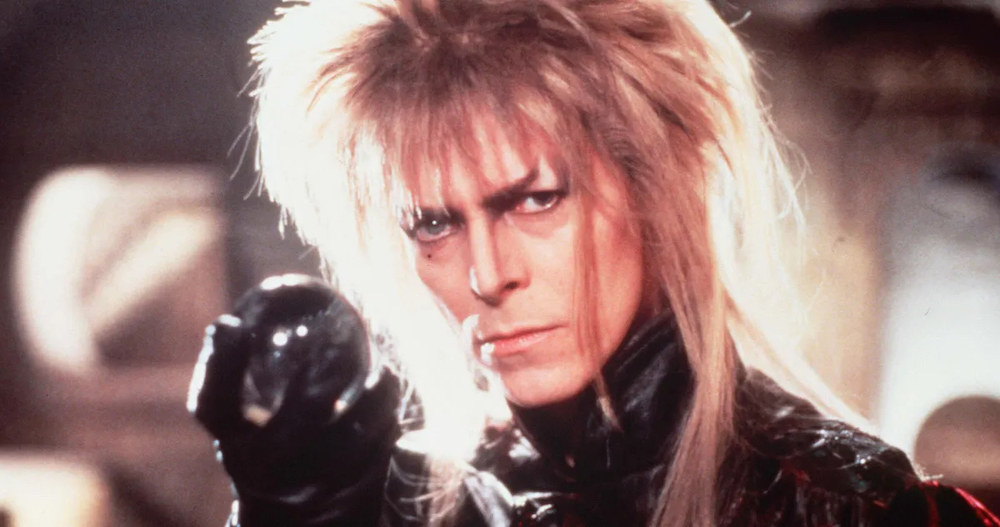
 Courtesy Piano Man Pictures
Courtesy Piano Man Pictures  Courtesy Piano Man Pictures
Courtesy Piano Man Pictures  Courtesy Piano Man Pictures
Courtesy Piano Man Pictures 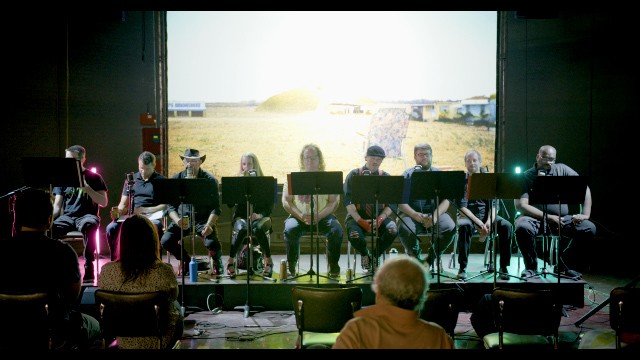 Courtesy Piano Man Pictures
Courtesy Piano Man Pictures  Courtesy Piano Man Pictures
Courtesy Piano Man Pictures 